15 Product Hunt Alternatives That Drive Real Growth (2025)
product hunt alternatives: You’ve poured your heart, soul, and probably way too much caffeine into building your product. Now comes the scary part: laun — learn
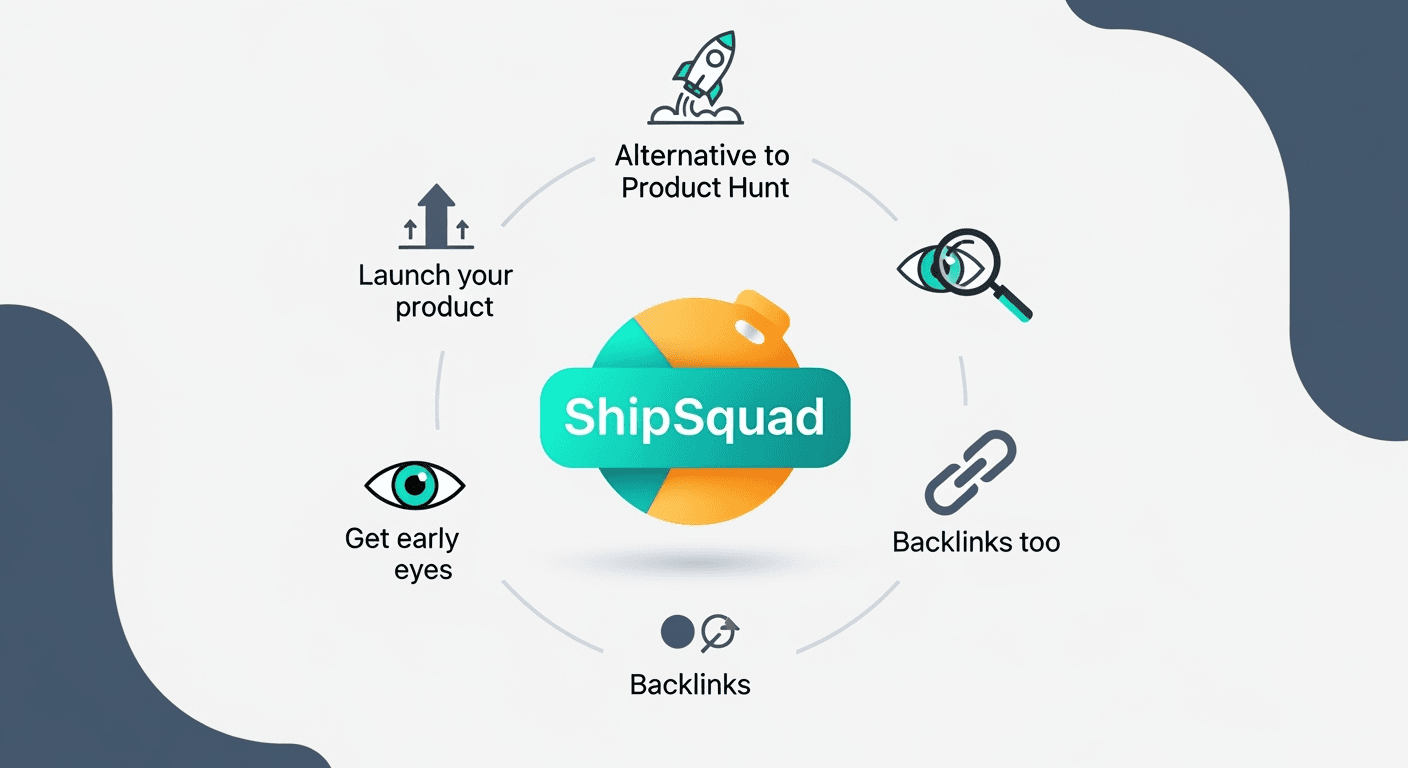
You’ve poured your heart, soul, and probably way too much caffeine into building your product. Now comes the scary part: launching it to the world. For years, Product Hunt has been the go-to stage for this big reveal. But let's be honest, launching there can feel like trying to win a shouting match in the middle of a rock concert. It’s crowded, fiercely competitive, and a single day’s spike in traffic doesn't always translate to long-term success. If you're an indie maker or an early-stage founder without a huge pre-existing audience, you need more than a fleeting moment in the spotlight. You need genuine feedback, early adopters, and something that actually helps your business grow. That’s why so many builders are now looking for powerful product hunt alternatives.
This guide is for you. We’re going to explore a world beyond the orange cat, focusing on platforms that offer sustainable growth, community engagement, and even crucial SEO benefits. We'll look at the best product hunt alternatives that can help you get those first crucial users and build a foundation for the future, especially if you're launching for the first time.
Table of Contents
- Why Even Look for Product Hunt Alternatives?
- The Best Product Hunt Alternatives for Every Founder
- Platforms for Community Feedback & Early Validation
- Niche-Specific Launchpads
- Developer-Centric Communities
- The SEO-Focused Approach to Launching
- Comparison: Which Product Hunt Alternative Is Right for You?
- Case Studies: Real Growth Beyond a One-Day Launch
- Your Launch Day Is Not the Finish Line
- Frequently Asked Questions (FAQs)
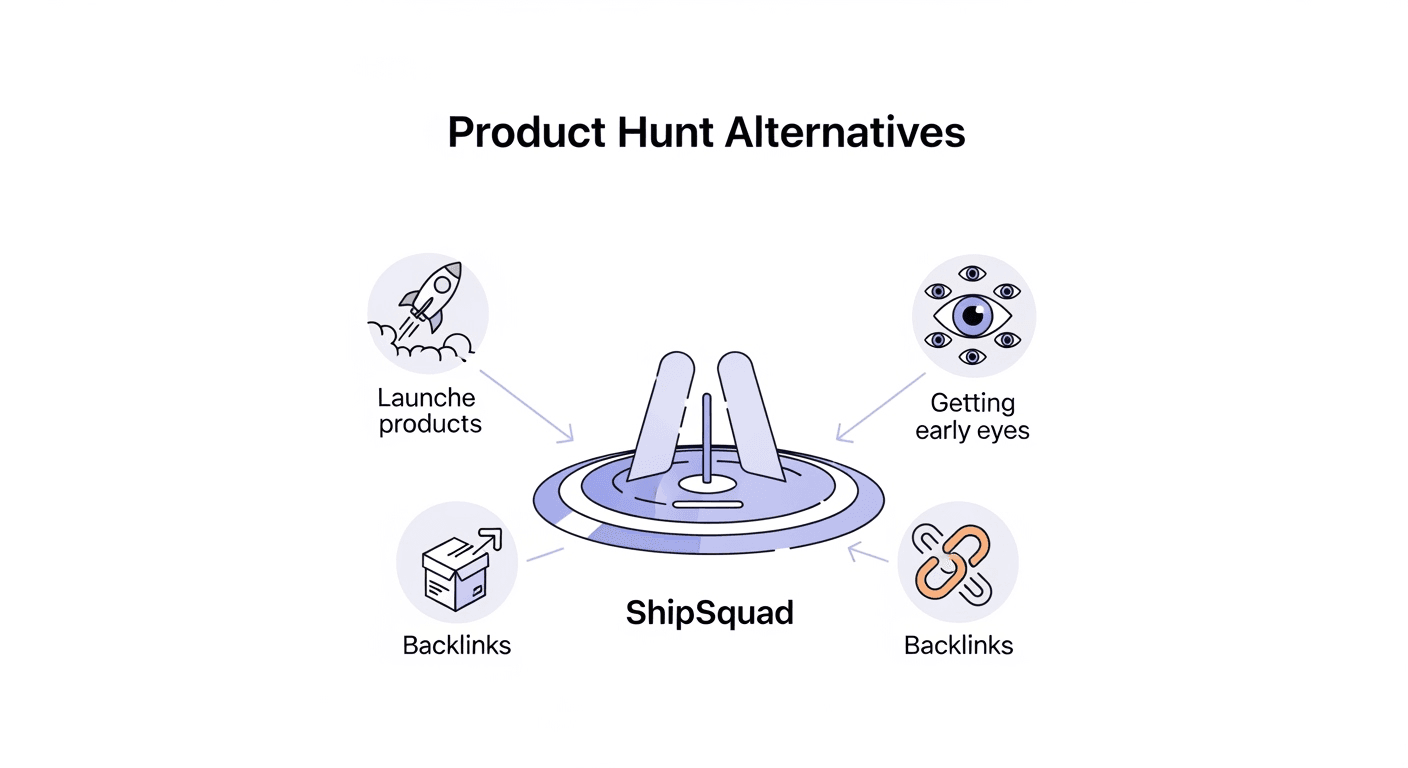
Why Even Look for Product Hunt Alternatives?
Product Hunt (https://www.producthunt.com) is a fantastic platform, no doubt. It democratized product launches. But its own success has created new challenges for newcomers.

The reality of launching on Product Hunt today is often a rude awakening for first-time founders. According to industry observations, a top 5 finish might bring in a few thousand visitors, but for most, the traffic is closer to a few hundred. And after 24 hours? It often drops off a cliff.
Here’s the breakdown of why you need product hunt alternatives in your launch strategy:
- The "Winner-Take-All" Effect: The front page gets almost all the attention. If you don't crack the top 5, your launch can feel like a dud, which is demoralizing when you've worked so hard.
- It Requires an Army: Successful launches often rely on a massive pre-existing audience on Twitter, a big email list, and a network of supporters ready to upvote at a moment's notice. What if you're just starting and don't have that?
- The Missing SEO Link: A Product Hunt launch gives you a temporary traffic boost and a single, often no-follow, backlink. It does very little for your long-term Search Engine Optimization (SEO). For a new business, quality backlinks are like gold; they signal to Google that your site is credible and authoritative.
You need a launch strategy that works for you after launch day. You need platforms that help you connect with real users, get honest feedback, and build a discoverable brand. You need product hunt alternatives.
The Best Product Hunt Alternatives for Every Founder
The right platform depends entirely on your goal. Are you looking for brutally honest feedback from developers? Do you want to get in front of a curated list of early adopters? Or are you playing the long game and want to build SEO authority from day one?
Let's dive into some of the best product hunt alternatives.
Platforms for Community Feedback & Early Validation
These platforms are less about a one-day competition and more about joining a conversation.
- Indie Hackers (https://www.indiehackers.com/)
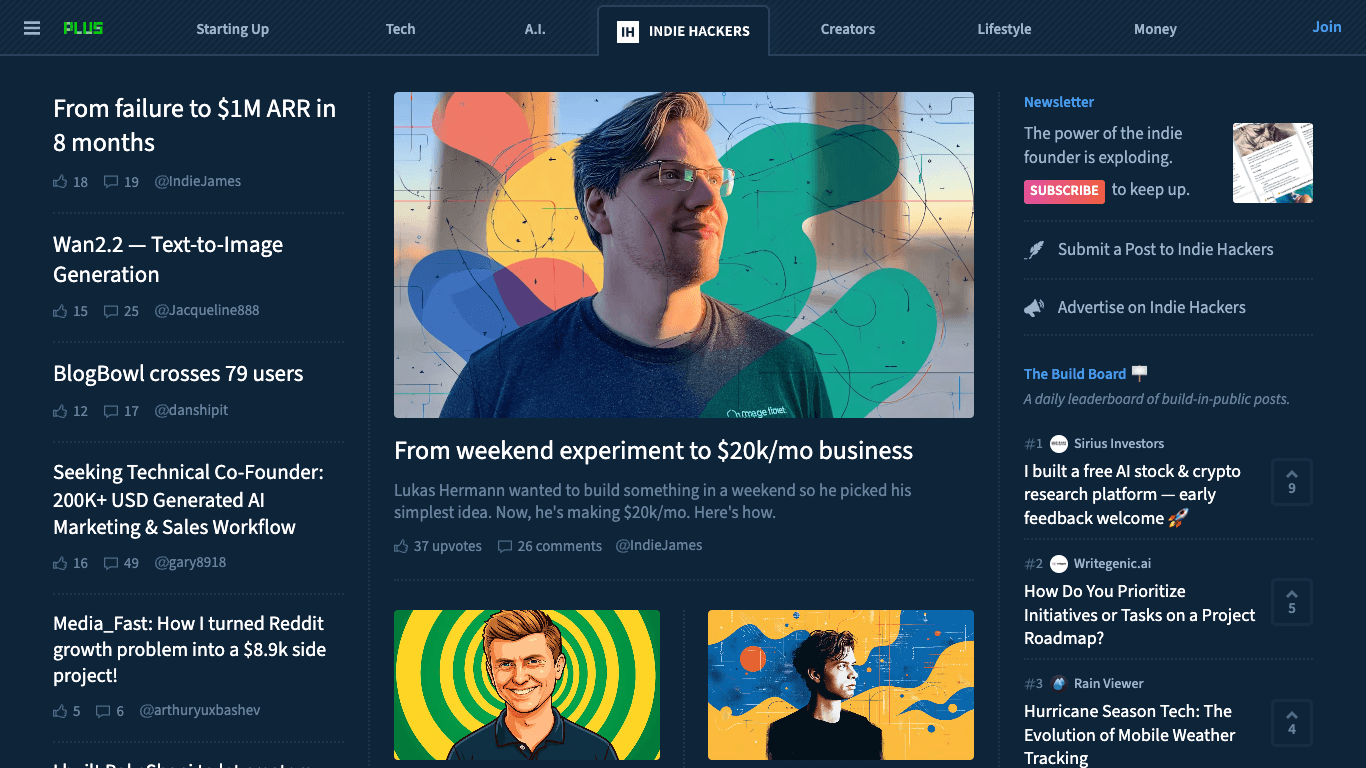
* **What it is:** A community of bootstrapped founders, developers, and entrepreneurs sharing their stories, revenue numbers, and lessons learned. You can post product updates, ask for feedback, and engage in relevant discussions.
* **Best for:** Getting honest feedback from fellow builders and finding your first few paying customers. It's perfect for those who want to build in public.
* **Why it's a great alternative:** It’s a supportive community, not a contest. The connections you make here can be far more valuable than a traffic spike.- BetaList (https://betalist.com/)

* **What it is:** A curated directory of pre-launch startups. BetaList features new internet startups and allows them to collect sign-ups before they go live.
* **Best for:** Validating an idea and building a waitlist of eager early adopters before you've even finished building.
* **Why it's a great alternative:** It focuses on the crucial pre-launch phase. There's a free submission option, but a paid feature can get you listed faster and on the homepage.- Hacker News (https://news.ycombinator.com/)
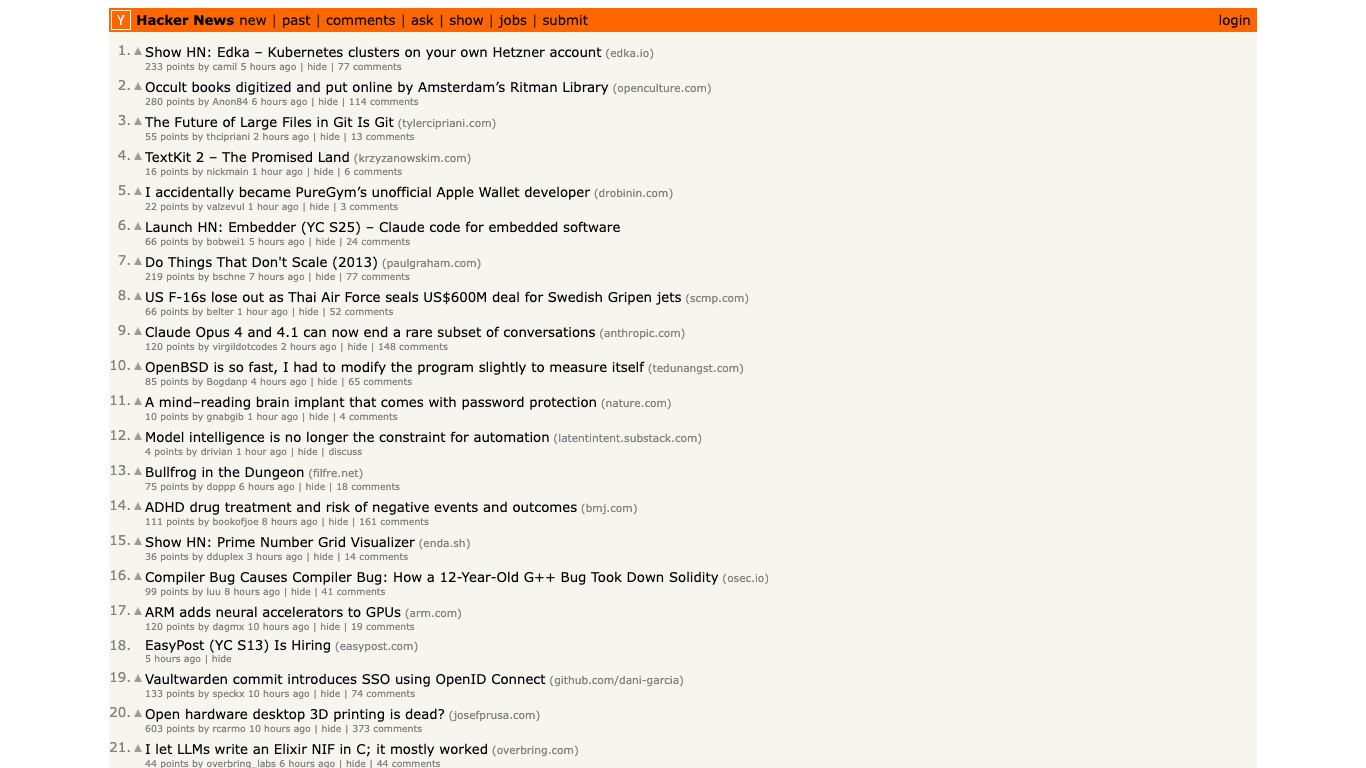
* **What it is:** A social news website focused on computer science and entrepreneurship, run by the startup incubator Y Combinator.
* **Best for:** Products that are technically interesting or solve a real problem for developers and tech-savvy founders. A "Show HN" post can drive significant, highly qualified traffic if it resonates.
* **Why it's a great alternative:** The audience is incredibly sharp. If your product has technical merit, you'll get amazing feedback. Be warned, though: the comments can be brutally honest.- Reddit (https://www.reddit.com/)
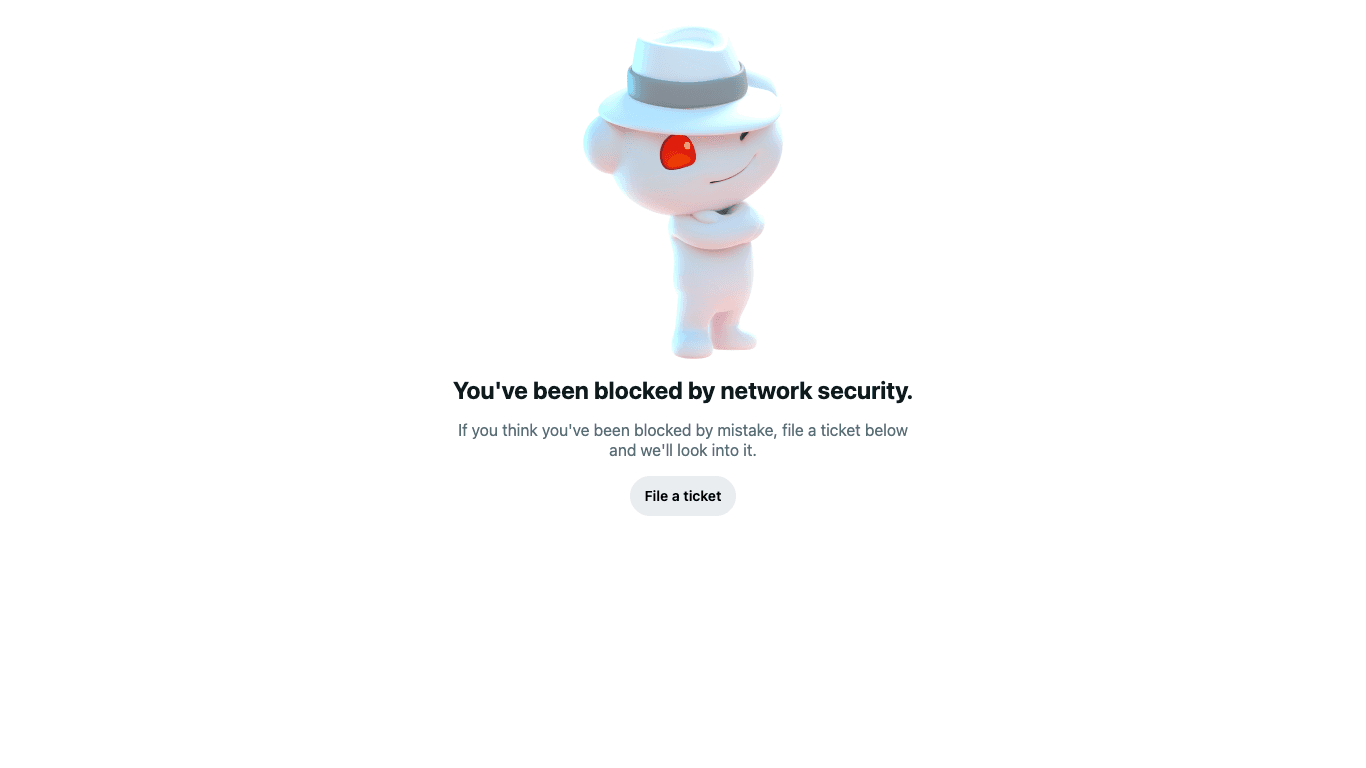
* **What it is:** A network of communities (subreddits) based on people's interests.
* **Best for:** Finding your exact niche. There are subreddits for everything, from `r/SaaS` and `r/sideproject` to `r/macapps`.
* **Why it's a great alternative:** It allows for hyper-targeted launches. Instead of shouting into the void, you can present your product to a small, passionate community that is already looking for a solution like yours. Just be sure to read the rules of each subreddit; self-promotion is often frowned upon unless you're an active community member.Niche-Specific Launchpads
Sometimes, it's better to be a big fish in a small pond. These product hunt alternatives focus on specific industries.
- SaaSHub (https://www.saashub.com/)
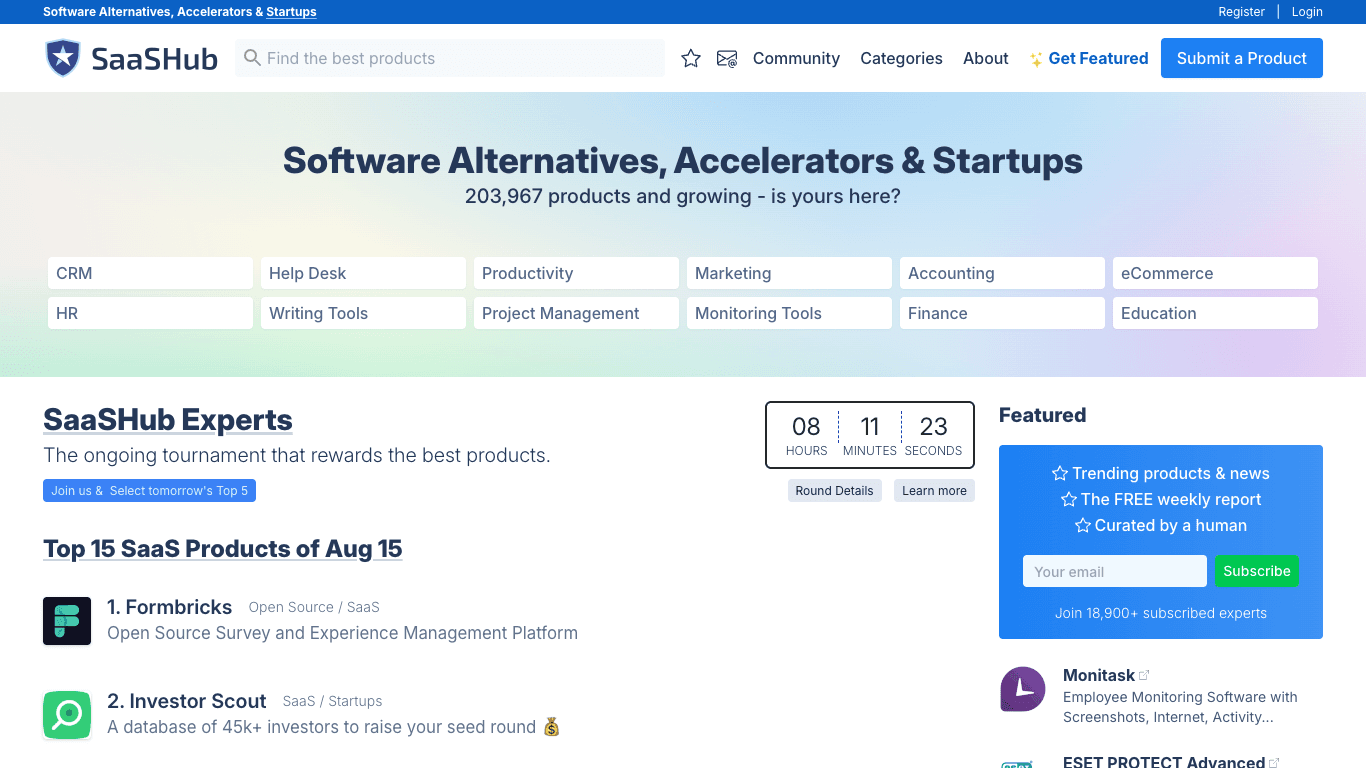
* **What it is:** A marketplace for SaaS products. It helps users find the best software by comparing alternatives and providing unbiased information.
* **Best for:** SaaS founders who want to be discovered by users actively searching for new tools.
* **Why it's a great alternative:** It's a discovery platform, meaning your product can be found long after its "launch day." Getting listed here puts you in direct comparison with established players.- AlternativeTo (https://alternativeto.net/)
- What it is: A crowdsourced site for finding better alternatives to well-known software.
- Best for: Products that are direct competitors or unique takes on existing popular software.
- Why it's a great alternative: It taps directly into user search intent. When someone is unhappy with a tool they're using, they go to AlternativeTo. If your product is listed as a viable option, you get highly motivated traffic.
- Launching Next (https://www.launchingnext.com/)
- What it is: A curated showcase of the most promising new startups and tech products.
- Best for: Polished products with a great landing page and a clear value proposition.
- Why it's a great alternative: It has a strong focus on design and innovation. A feature on Launching Next can give your product a stamp of quality.
Developer-Centric Communities
If your product is for developers, you need to go where they live.
- DevHunt (https://devhunt.org/)
- What it is: Essentially, Product Hunt but exclusively for developer tools.
- Best for: APIs, libraries, VS Code extensions, open-source projects, and any tool that makes a developer's life easier.
- Why it's a great alternative: Your product won't get lost among consumer apps and no-code tools. You're launching to your exact target audience.
- GitHub (https://github.com/)
- What it is: The world's largest community of developers.
- Best for: Open-source projects.
- Why it's a great alternative: While not a "launch platform" in the traditional sense, getting your repository to trend on GitHub can be more powerful than any launch site. A well-written README and active engagement can attract contributors and users organically.
- HackerNoon (https://hackernoon.com/)
- What it is: A popular tech publication where anyone can contribute stories.
- Best for: Founders who can write a compelling story about how and why they built their product.
- Why it's a great alternative: You can go deep into the technical challenges, the market insights, and the vision behind your product. A well-written article can establish you as a thought leader and drive traffic for months or even years.
The SEO-Focused Approach to Launching
What if a launch platform could give you both visibility and a lasting SEO boost? This is a newer, and frankly, smarter way to think about launching. The problem with most launch platforms is that the benefits are temporary.
This is the exact problem ShipSquad was built to solve. It’s a new platform designed for indie builders who want more than just a 24-hour traffic spike. The core idea is simple: launch your product for free, get discovered by early adopters, and earn quality backlinks that help your site rank on Google. It’s one of the most promising product hunt alternatives because it focuses on sustainable, long-term growth.
Instead of just one link, ShipSquad helps you build a foundation of credibility with search engines, making it easier for users to find you organically long after your launch is over. For early-stage founders, this is a game-changer.
Ready to try a launch that keeps on giving? Check out ShipSquad and get early access.
Comparison: Which Product Hunt Alternative Is Right for You?
Feeling a little overwhelmed? It’s okay. Let’s break it down. What I'd tell a friend is to pick one or two platforms that align perfectly with your primary goal.
Here’s a simple comparison to help you decide.
| Platform | Best For | Key Feature | SEO Benefit | Cost |
|---|---|---|---|---|
| Product Hunt | Broad visibility, consumer apps | Daily ranking competition | Low (one link) | Free |
| Indie Hackers | Community feedback, transparency | Building in public, founder stories | Medium (forum links) | Free |
| Hacker News | Technically-savvy audience | "Show HN" posts | Medium (if it hits the front page) | Free |
| BetaList | Pre-launch validation | Building a waitlist | Low | Free & Paid |
| ShipSquad | SEO growth & early users | Backlink generation | High (multiple quality links) | Free |
Case Studies: Real Growth Beyond a One-Day Launch
Theory is great, but let's talk results. Here are a couple of scenarios that show the power of using product hunt alternatives.
Case Study 1: The Niche SaaS Tool
- The Founder: Sarah, a solo developer, built a project management tool specifically for landscape architects. It was a super-niche product.
- The Challenge: Launching on a broad platform like Product Hunt would be a waste. Her target audience wasn't there. She had no existing audience and a marketing budget of zero.
- The Strategy:
- She became an active member of the
andr/landscaping
subreddits, offering advice without mentioning her product.r/smallbusiness - For her launch, she posted a detailed story on Indie Hackers about her journey building the tool.
- Simultaneously, she used a platform like ShipSquad to get her first handful of users and, more importantly, secure backlinks from relevant tech blogs that reviewed her tool.
- She became an active member of the
- The Outcome: The Indie Hackers post drove 50 high-quality sign-ups from fellow founders. The backlinks from her ShipSquad launch helped her new domain gain authority. Within three months, she started ranking on the second page of Google for "project management software for landscape architects." Recent data shows that ranking on the first page of Google can lead to a click-through rate of over 28%, so this initial traction was huge. She didn't get a massive traffic spike, but she got something better: a slow, steady stream of her exact target customers.
Case Study 2: The Simple Productivity App
- The Founder: Mike, a designer, created a beautiful, minimalist to-do list app for macOS.
- The Challenge: The productivity space is incredibly crowded. He needed to stand out and get noticed by people who appreciate good design.
- The Strategy:
- He submitted his app to BetaList three months before launch, building a waitlist of 500 interested users.
- He wrote a guest post for a popular design blog about the principles of minimalist UI, with a small mention of his upcoming app.
- For the launch itself, he focused on niche directories like
and sites that curate well-designed products.r/macapps
- The Outcome: The pre-launch waitlist ensured he had users on day one. The Reddit post drove a few hundred downloads and, more importantly, a ton of passionate feedback. The app got featured on several design-focused newsletters, leading to sustained, organic growth. This multi-platform approach created waves, not just a single splash.
These examples show that a smart, targeted launch strategy using product hunt alternatives is often more effective than putting all your eggs in one basket.
Your Launch Day Is Not the Finish Line
Thinking of your launch as a single day is a recipe for disappointment. It's not a finish line; it's the starting gun.
The goal isn't to get the most upvotes. The goal is to build a sustainable business. That means finding the right users, getting feedback, and creating a marketing engine that works while you sleep. SEO is a huge part of that engine.
This is why focusing on product hunt alternatives that provide more than just vanity metrics is so critical. You need platforms that connect you with communities and build your brand's authority over time.
Are you ready to plan a launch that builds your business for the long term?
Join the waitlist for ShipSquad and launch your product with visibility AND SEO power.
Recommended Videos
- How To Launch on Product Hunt (And Actually Succeed) - A great primer on the classic approach, which helps understand the context for why alternatives are needed.
- Finding Your First 100 Customers for a New Product - This video offers practical strategies that go beyond any single launch platform.
Frequently Asked Questions (FAQs)
1. Is Product Hunt still relevant in 2025?
Absolutely. It's a massive platform and a big launch can still be very impactful, especially for consumer-facing products. However, it's no longer the only option, and for many early-stage founders, more targeted product hunt alternatives can provide better results.
2. How many platforms should I launch on?
Don't spread yourself too thin. It's better to have a deep, meaningful launch on two or three relevant platforms than a lazy, spammy launch on ten. Pick platforms where your target audience actually spends their time.
3. Can I launch on Product Hunt and other alternatives at the same time?
Yes, and this is often a good strategy. You can use Product Hunt for a broad awareness push while using platforms like Indie Hackers for community engagement and ShipSquad for building your SEO foundation with backlinks.
4. What's the most important thing for a successful product launch?
It's not the platform; it's the preparation. A clear landing page, a compelling product, and a story that resonates with people are crucial. The platform is just the amplifier.
5. How important are backlinks for a new product?
Extremely important. Backlinks from reputable sites are one of the strongest signals to Google that your website is trustworthy. For a new domain, getting those first few quality backlinks can dramatically shorten the time it takes to start showing up in search results.
6. Are there any free product hunt alternatives?
Yes, most of the platforms listed above, including Indie Hackers, Hacker News, Reddit, and ShipSquad, are free. Some, like BetaList, have paid options for more visibility, but all offer a free way to get your product out there. This makes them fantastic product hunt alternatives for bootstrapped founders.